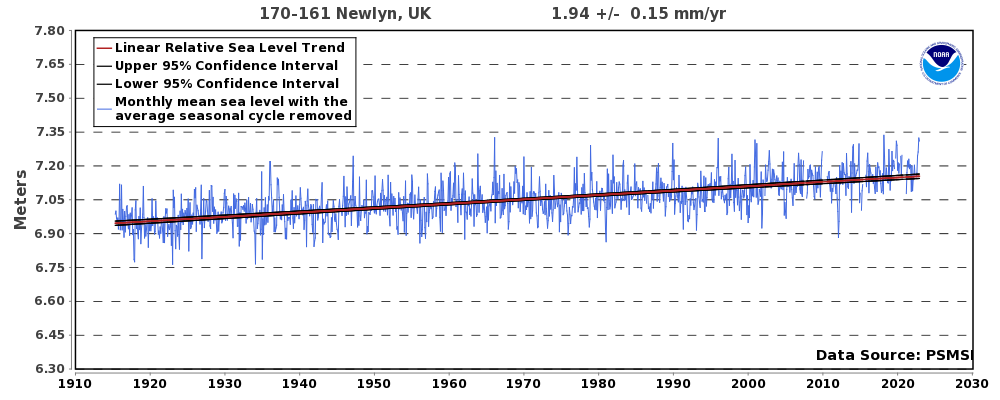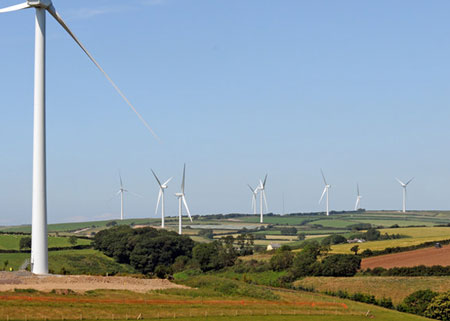By Paul Homewood
This came to my attention the other day, and it shows just how deeply climate change hysteria has infected the business of government.
https://www.northdevon-aonb.org.uk/about/management-plan-2019-2024
For those not familiar with North Devon, it is in my view one of the most beautiful parts of the country, with some of the finest landscapes and seascapes. Much of it is wild and rugged, and in many ways unmatched in England.
Quite rightly, the North Devon Coast has been designated as an Area of Outstanding Natural Beauty, and there is an obligation on the local authorities involved to prepare regular Management Plans, in order to conserve and enhance the natural beauty there.
These plans involve all sorts of objectives and policies, such as landscapes, biodiversity, historical environment, infrastructure, farming, access and many others.
Tucked away in the latest Consultation Draft, you probably won't be surprised to learn, is a section called Environmental Quality and Climate Change.
The first paragraph states:
Climate change is one of the most significant pressures on the environment of South West England this is reflected in hotter and drier summers, warmer and wetter winters with more extreme weather and increased flood risk compounded by sea-level rise. The ability of the AONB Partnership to contribute to the mitigation of the effects of climate change is minimal in global terms. However, the Partnership can, and should, support local adaptation and mitigation initiatives which will have a positive impact
Apparently this is more important than the next paragraph, which goes on to talk about clean air, light pollution, clean bathing waters, and tranquillity, all things that any normal person would regard as of vital importance.
But what about the claims for climate change – hotter and drier summers, warmer and wetter winters with more extreme weather and increased flood risk compounded by sea-level rise?
Let's start with rainfall.
According to the long term Met Office data for the South West, winters are not getting wetter. Apart from the record wet winter of 2013/14, there has been nothing out of the ordinary at all about winter rainfall in the last decade or so.
https://www.metoffice.gov.uk/hadobs/hadukp/
Equally, there is no evidence that summers are getting any drier.
But what about temperatures?
The Report makes no attempt to explain why a warmer climate should put any significant pressures on the environment of South West England .
In any event, the actual data tells us a slightly different story.
Apart from the winter of 2015/16, other recent winters have not been unprecedented. What stands out most is the relative absence of exceptionally cold winters lately.
The Report talks about extreme weather, but as far as winter temperatures are concerned, winter weather was much more extreme in the past.
https://www.metoffice.gov.uk/climate/uk/summaries/datasets
As for summers, it is apparent that we have frequently had summers in the past just as hot as recent ones.
Even last summer was barely hotter than 1911.
As with winters, there is an absence lately of dismally cold summers, surely much more damaging to the environment.
https://www.metoffice.gov.uk/climate/uk/summaries/datasets
And what about flooding?
Perhaps one of the best indicators of extreme rainfall is the monthly stats. While we do see flash floods from time to time, such as Lynmouth and Boscastle, the floods that really do the damage are the result of long accumulations of rain.
The chart below plots all months with over 170mm:
https://www.metoffice.gov.uk/hadobs/hadukp/data/download.html
The wettest month by far was November 1929, followed by December 1934. By contrast the wettest month in recent times was January 2014, yet this only ranks 4th wettest, behind October 1903.
There have been seven months in the last ten years that appear on the chart, slightly above the average of 5.3. Historically however, that frequency is by no means unusual, and the 2001-10 period had the fewest months on record.
Clearly there is no evidence here of increased flood risk.
https://www.metoffice.gov.uk/hadobs/hadukp/data/download.html
The reference to sea level rise is very much a red herring.
The long term rate of rise is 1.81mm/yr, about half of which is the result of sinking land. The rate is not increasing either.
Such a small rise will make no difference to the North Devon Coast.

https://tidesandcurrents.noaa.gov/sltrends/sltrends_station.shtml?id=170-161
I cannot finish without a mention of wind farms.

Fullabrook Wind Farm, Devon
I find it incredible that Management Plan has virtually nothing to say about the impact on the environment of wind farms.
I have searched the whole document, and only found two references to wind turbines, both of which are mentioned only in passing.
Nowhere is there any suggestion that the wretched things be banned from the AONB, or even subject to local approval. Nor even a recognition of the damage to the environment already done.
Yet wind farms, such as Fullabrook, between Barnstaple and Ilfracombe, have probably done more to ruin one of England's finest landscapes than anything else in recent history.
from Climate Change Skeptic Blogs via hj on Inoreader http://bit.ly/2SUWTtx







No comments:
Post a Comment